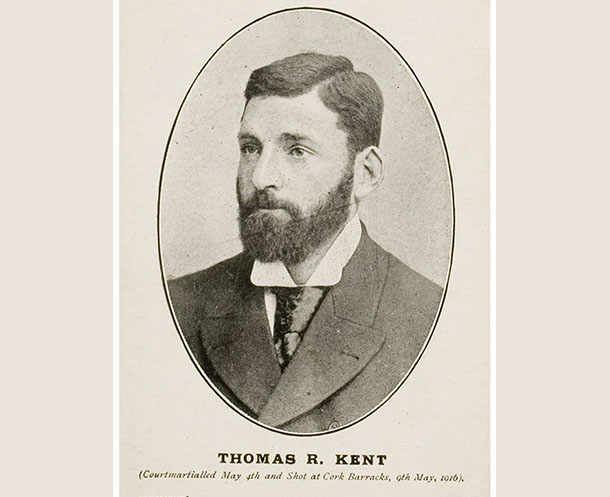18 September 2015
The death of 1916 rebel Thomas Kent

THOMAS KENT was the only rebel leader to be executed outside of Dublin in the immediate aftermath of the 1916 Easter Rising. (Roger Casement would be hanged in Pentonville Prison, England, three months later)
The Kent family from Castlelyons, East Cork, had long been active in agitation against British rule.Thomas's three brothers had been very active in the Land League and a cousin was involved in the Fenian dynamite campaign in Britain. The Kent brothers formed the core of the local Irish Volunteer force in the area.
Before the Rising, Thomas Kent was imprisoned for two months in February 1916 for agitation. Immediately on his release, he resumed his activities.
The four Kent brothers had planned to take part in the Easter Rising and had departed for Dublin but, on hearing Eoin MacNeill's countermanding order, turned back on 1 May and headed home.
Early the next morning a force of Royal Irish Constabulary surrounded the family's Bawnard House home.
The Kerryman newspaper reported that the RIC demanded the surrender of arms and wanted to "arrest members of the family who are identified with the Sinn Féin movement".
Thomas, David, Richard and William Kent along with their 84-year-old mother Mary refused to surrender and a fierce firefight ensued. The British military soon arrived to reinforce the RIC. During the battle David Kent was injured and the RIC Head Constable WM Rowe was killed.
A report from the time noted that:
"The old lady loaded rifles and shotguns while her sons blazed away." The Kents resisted until they ran out of ammunition and the house was badly damaged.
When they surrendered, British soldiers lined the brothers up against the wall and were preparing to shoot them only for the intervention of a medical officer.
Richard Kent attempted to escape and was shot and fatally injured. Thomas and William Kent were court-martialed, with Thomas sentenced to death and William acquitted.
Thomas was executed by a British naval detachment on 9 May at Victoria Barracks (now Cork City Prison) and buried within its walls.
They day following his execution, the Irish Independent in its editorial – and seemingly still unaware of his court martial and shooting – called on the British Government to be "stern and strong, and take such measures as will put an end once and for all to the criminal madness which inspired the recent rising."
It went on to warn the British against showing "too great leniency" and appearing weak when dealing with the leaders of the Rising and pushed for the execution of leaders such as James Connolly: "Let the worst of the ringleaders be singled out and dealt with as they deserve."
Public reaction, however, was markedly different. George Bernard Shaw, in a letter to the Daily News, wrote:
"My own view... is that the men who were shot in cold blood after capture or surrender were prisoners of war, and that it was, therefore, entirely incorrect to slaughter them. The shot Irishmen will now take their places beside Emmet and the Manchester Martyrs in Ireland and beside the heroes of Poland and Serbia and Belgium in Europe; and nothing in heaven and earth can prevent it."
Follow us on Facebook
An Phoblacht on Twitter
Uncomfortable Conversations

An initiative for dialogue
for reconciliation
— — — — — — —
Contributions from key figures in the churches, academia and wider civic society as well as senior republican figures





